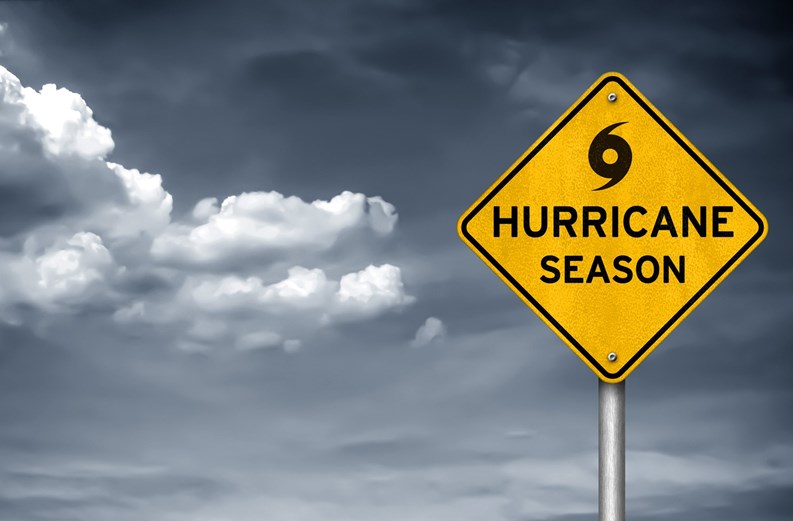From flood waters and property damage to power loss and spoiled food, coping with the aftermath of a powerful storm can be very troublesome for co-op and condo community board members, owners, and tenants. Therefore, during the Atlantic Hurricane season, which officially began on June 1st and runs through November 30, managers and boards must take a multi-pronged approach to safety. First, crisis communications, management and business continuity planning, and then backup efforts with the proper insurance coverage.
In 2021, there were 20 separate billion-dollar weather and climate disasters. The total cost for these events was $145 billion, making last year the third most costly year on record, according to data from the Colorado State University Tropical Meteorology Project. Through initial predictions, the CSU team predicts an "above-normal" Atlantic hurricane season. The team forecasts 19 named storms, including nine hurricanes, four of which will be major hurricanes.
While communities have no control over the weather, taking the proper steps before a hurricane hits can lessen the impact of a major storm. Generally speaking, the three main goals of any disaster management plan are to manage the business during the crisis, resume normal operations as quickly as possible, and recover losses when it is over. By taking these goals into account when surveying the most critical areas of the business, companies can determine what steps they need to take to be fully prepared for hurricane season and beyond.
It’s important to examine your insurance policies (and any potential gaps in coverage) in advance with your professional advisor as there are a variety of policies to help coastal and non-coastal businesses recover from an event – each involving a different aspect of the restoration.
- Business income coverage. Review your business income coverage limits, which include loss of income as a result of an event, to ensure they are sufficient. Extra expense coverage often accompanies business income coverage for necessary costs, such as having to relocate your business operations to a temporary location as a result of storm related damage. Business Income coverage should be provided for 24 months. If there is a major hurricane claim it would be difficult or impossible to complete repairs and restore full income in 12 months.
- Flood coverage. Many business property policies exclude flood coverage. In addition, some Associations buy minimum flood coverage limits, but don’t consider that floods can come from even minor storms or no storm at all. The Federal Emergency Management Administration (FEMA) has rolled out a new risk methodology for flood insurance pricing called Risk Rating 2.0, resetting flood insurance rates for the first time in decades. As of April 1, 2022, this revised rating methodology for National Flood Insurance Program (NFIP), applies to all policies, new and renewing. In addition to property characteristics such as elevation, the location of machinery and equipment and the cost to rebuild, the new rating structure accounts for flood frequency, distance from a water source, and the likelihood for multiple flood types such as river overflow, storm surge, coastal erosion, and heavy rainfall.
- Examine deductibles. What type of deductible do you have on property coverage – a percentage or flat deductible? A calendar year or occurrence deductible? Additionally, many policies will have lower deductibles for wind and hail events than for a named storm.
The current insurance market is very volatile with rate increases seen in almost all lines of business. Insurance carriers are underwriting more closely with greater demands on inspections and loss control recommendations and requirements.
The following are suggested measures you can take in partnership with your insurance advisor to reduce exposure to claims and to demonstrate to the insurance marketplace why they should underwrite your property:
- Be proactive on safety including organized water mitigation plans and battening down all outside furniture, construction debris and materials on the roof or elevated areas
- Be proactive on contractual risk transfer. Actively promote placement of proper Homeowners coverage on the part of all unit owners.
- Address property upgrades where possible, i.e., roof, electrical, plumbing, etc.;
- Implement outstanding recommendations from previous insurance carrier inspections;
- Regarding past losses, be prepared to explain corrective actions taken to prevent similar losses in the future.
Hurricanes can pose major challenges but by taking the appropriate steps ahead of time and working with the proper experts, coop and condo boards and managers can help to ensure that their properties and tenants can weather any storm. Review your policy with an experienced insurance advisor now to ensure that you have the coverages and policy limits that you need to be adequately protected before a storm strikes.
Alex Seaman currently serves as Senior Vice President of HUB International Northeast, a leading full-service global insurance brokerage. Alex can be reached by phone at 516-677-4708 or at alex.seaman@hubinternational.com. For more information on HUB, please visit www.hubinternational.com.
Visit HUB’s dedicated Hurricane Resource Center for timely updates and preparedness resources: www.hubinternational.com/products/risk-services/hub-crisis-resources/hurricane-resource-center/







Leave a Comment